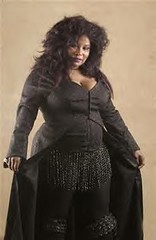
Chaka Khan will be featured in the play "The Color Purple." The Rhythm & Blues and Jazz artist is embarking upon a new avenue of creative expression through theater.
Originally uploaded by Pan-African News Wire File Photos
The Many Shades of Chaka Khan, Now in ‘Purple’
By CELIA McGEE
New York Times
THE Broadway stage has seen celebrities come, and it has seen them go, but it may just have to get up off its doubts for Chaka Khan. This R&B and funk star begins performing as the sassy, fearless Sofia in “The Color Purple” on Jan. 9.
Ms. Khan’s list of theatrical credits is short, but her string of Grammy Awards is long, and she is up for two more for “Funk This,” her first studio album in 10 years. Those who remember Ms. Khan as the erstwhile Yvette Marie Stevens, the petite high school student who changed her name when she went to work for the Black Panthers, or as the lead singer of Rufus in the ’70s, or as the leather-and-feathers ’80s disco queen, will have to adjust their Ray-Bans for the musical’s Hoover-era Sofia with her long skirts and history. Until they hear her.
Ms. Khan, 54, takes over the role as the veteran gospel star BeBe Winans joins the production as Sofia’s husband, Harpo, and newcomer Zonya Love starts as Celie. Between rehearsing her numbers at the Broadway Theater, Ms. Khan spoke to Celia McGee. These are excerpts from their conversation.
Q. That’s quite a charm bracelet. What’s on there?
A. This charm, here, represents the three ARCs of Scientology.
Q. Religion is important in “The Color Purple.” Are you a Scientologist?
A. I’m not, never was, never will be. I belong to the religion of the Church of Chaka Khan, and I practice it every day. I live my religion, I consider it a personal thing. But I’ve taken some courses in Scientology, and they’ve been very, very helpful through life’s ups and downs.
Q. With the exception of a few small screen roles and the musical “Mama, I Want to Sing” in London in 1995, which you said you hated, you haven’t acted before. How will you become Sofia?
A. I don’t have to. I am Sofia. We’re so much alike. We’re both nuts. Her fundamental application to life is the same emotionally. She’s one of the forefronters of women’s liberation and the first nonslave black woman who wasn’t a slave to anybody. I’m like that. I’d rather be dead. They might as well hang me. And like me Sofia comes from a matriarchal family. My mother’s side migrated up from Georgia. I had a lot of help from my ancestors with this. I saw such a kinship with the character. Still, I did everything I could to avoid [taking the role].
Q. How so?
A. I met with “The Color Purple” people at some ungodly hour of the morning. Probably around noon. I was a complete bitch at the interview, and it only made them want me more. They said, “You’re perfect!”
Q. Aren’t you more of a Shug Avery, the nightclub singer in the story?
A. Not at all. Though I did know girls like that, who lost count of who they’d been with. I was raised Catholic, and I was very Catholicized sexually. I had more hangups. I could never love like that.
Q. And Steven Spielberg approached you for the Shug role in the movie?
A. He chased me down. But I never considered myself an actress. I would make a good cinematographer, though. I have a great eye, and I can tell how good an actor is.
Q. Judging from the cover art on some of your albums, your official Web site (chakakhan.com) and the Chaka Khan Foundation’s (chakakhanfoundation.org), and some of your old photos, the color purple is significant to you.
A. I’ve done some reading, in anthropology and other places, on what the color can mean. It’s a color of royalty, and of mourning. The Aztecs considered it a mixture of blood and the sky. I’ve just always been attracted to it. Like everyone has a note on the piano that their body resonates to. It’s also the freak color, it’s associated with hippiedom, the free-spirited kind of thing.
Q. Which has always been one of your things. What about the African dance number in the show — does it take you back to your teenage days with the Afro-Arts Theater?
A. It gives me sort of flashbacks.
Q. And there was the period of drugs and alcohol.
A. I led a risky life. It was my youth, that invincibility thing. Then my Pisces side kicked in, and it told me exactly when to stop. Without that, I’d be dead.
Q. Sofia almost dies because of racism. What about racism today?
A. Racism is still very much alive, but it’s become intellectual. It’s practiced in a very high-minded way. It’s all smoke and mirrors. It’s not blatant outright whupping and lynching like in the past. It’s more psychological, and spiritual.
Q. You wrote an autobiography a few years ago. Would you write another book?
A. I may have to. So much of my life has become so much more interesting.
Q. What about those Chakalates chocolates you were involved with? Are you still?
A. Oh yes. We’re looking for a new deal so we can make them with that really dark chocolate that’s good for you.
Q. Do you have a favorite song in the show?
A. I do. But I’m not singing it, Celie sings it. It’s “Lily of the Field,” with those lines, “So many winters grey and summers blue/She must be dead/What kind of God are you?” I also love the one Shug sings to Celie, “Too Beautiful for Words.”
No comments:
Post a Comment